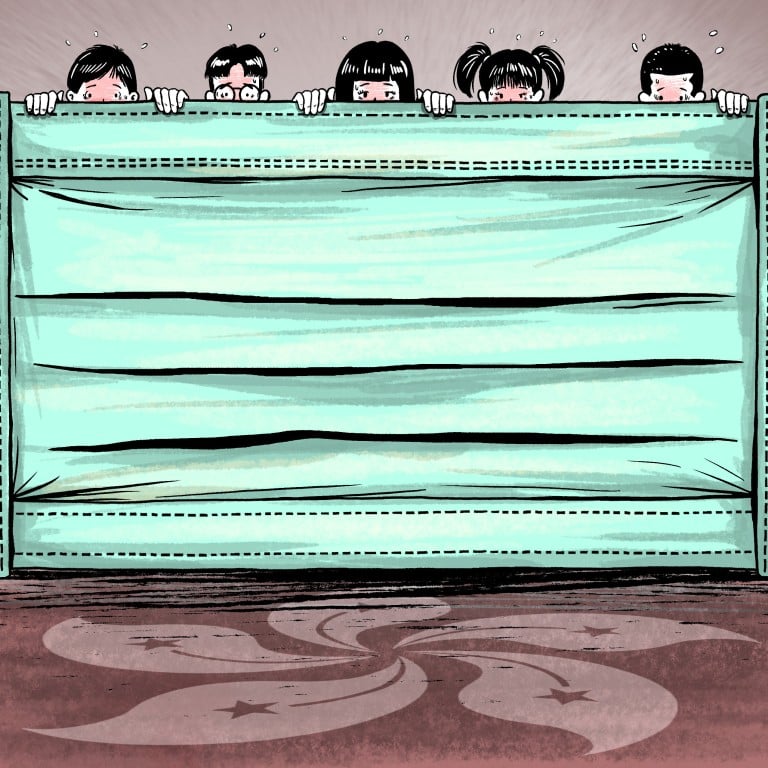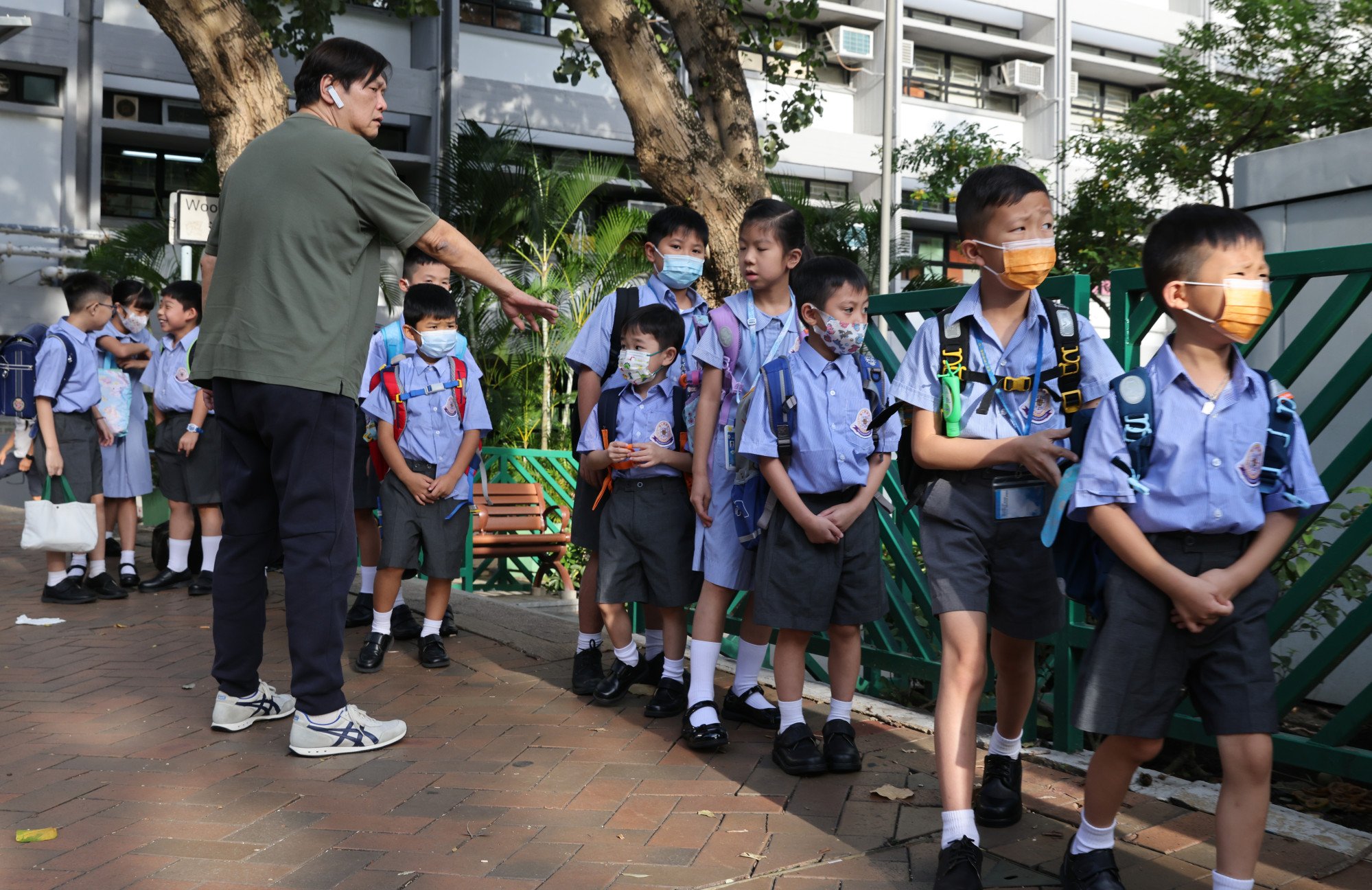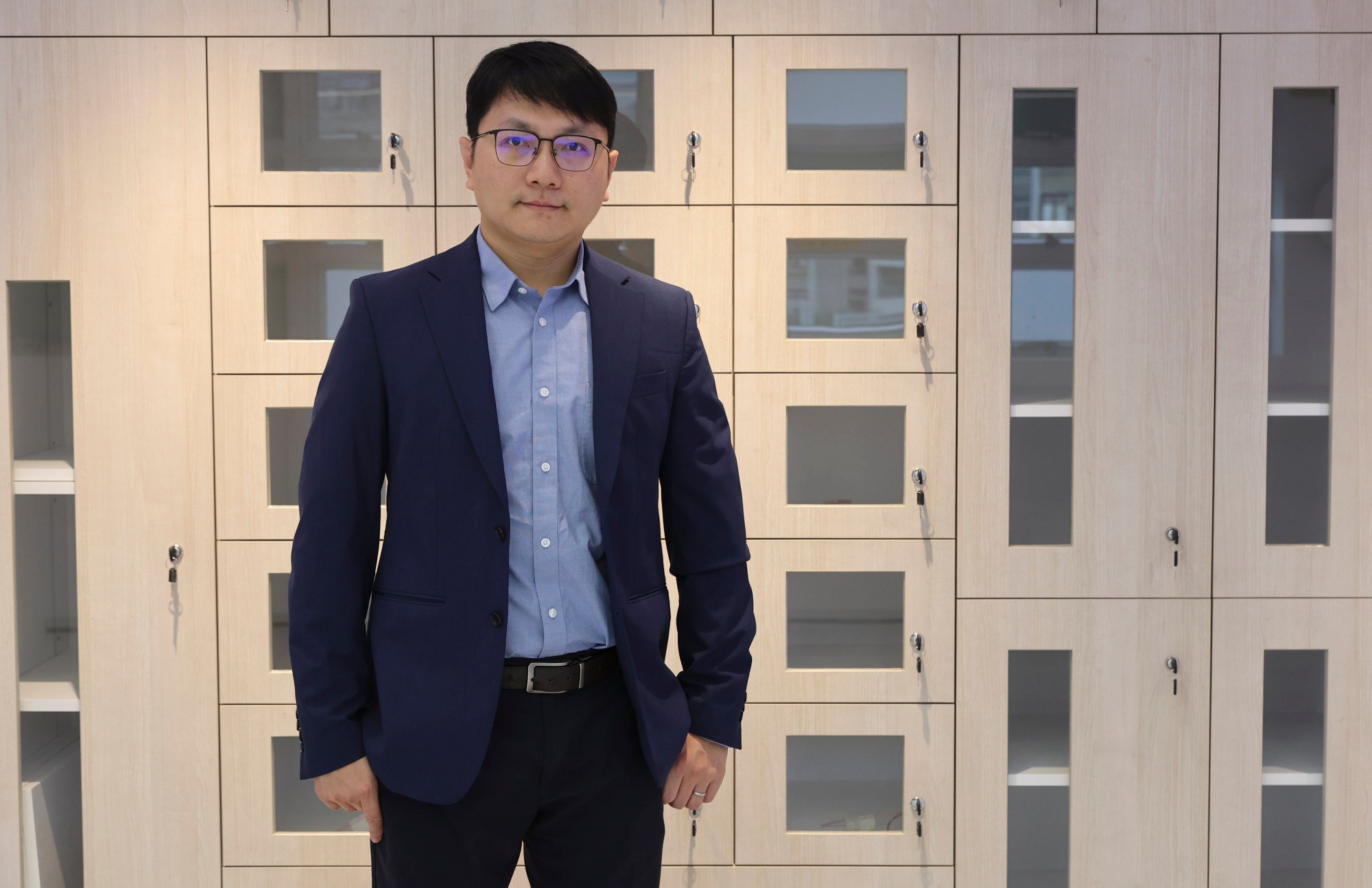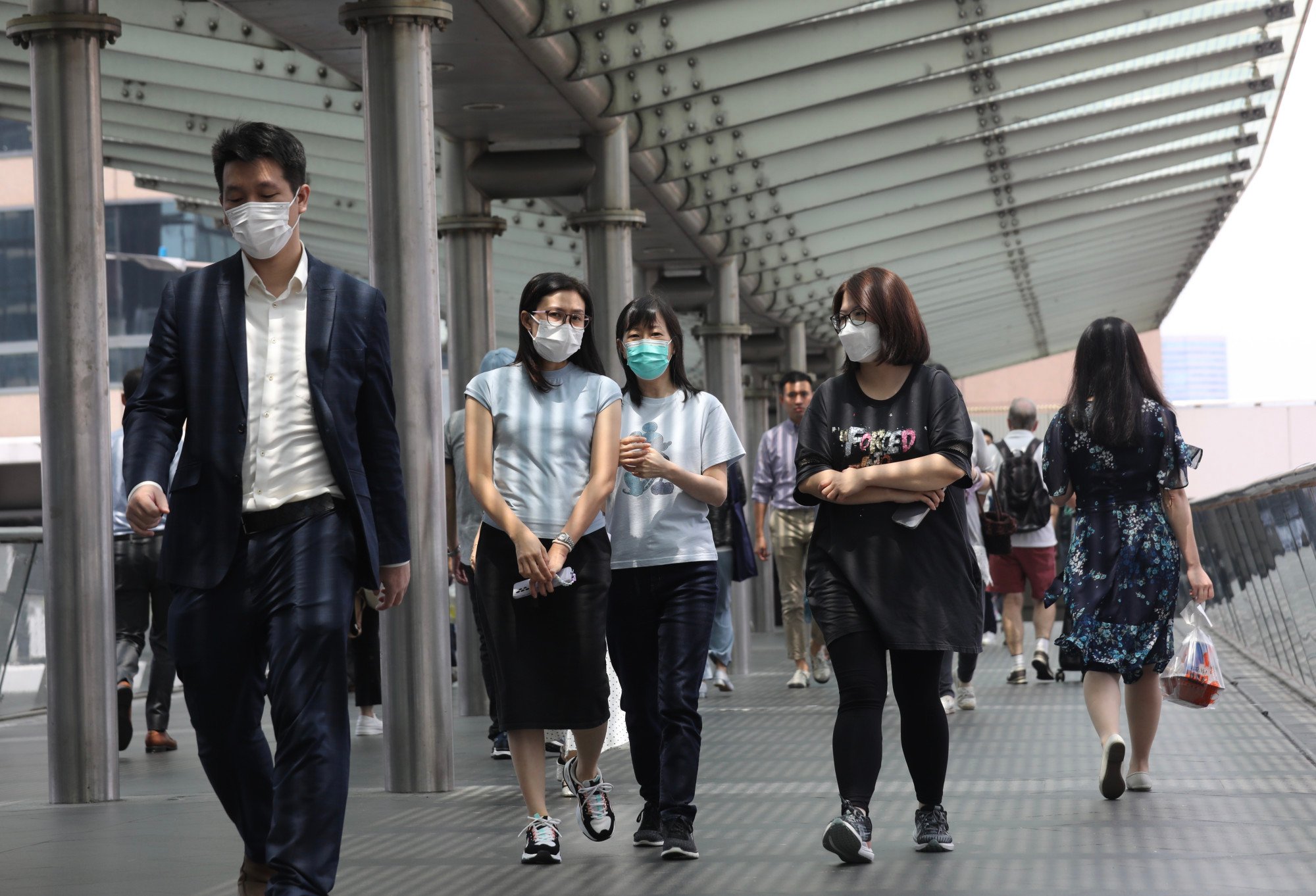
Hong Kong’s Covid mask rules are long gone, so why are so many children and teenagers still covering up?
- Anxious parents want young children to avoid infections, while some teens feel insecure showing their faces
- Youth workers and doctors urge more resources to help youngsters and warn of developmental problems amid concerns about mental health impact
On a sweltering afternoon in Hong Kong, homemaker Shirley Lee watches over her son and daughter at a playground in Causeway Bay, holding on to their backpacks, water bottles and masks.
“I make them wear a mask except in open-air places. The influenza viruses and germs are spreading everywhere these days,” said the 40-year-old, who was masked herself.
“My children have been taking turns to fall ill, far more frequently than in pre-Covid times, so our doctor recommended wearing a mask in crowded places.”
Her children, aged seven and eight, are not the only ones covering up. Lee said many of their classmates were also wearing masks to avoid falling ill.
Experts said the heightened health awareness helped to shield the city from the recent flu surge.
But some children and teenagers have been found to be keeping their masks on to maintain a barrier with other people or to conceal what they consider physical imperfections.
Warning of potential implications for the youngsters’ mental health and development, youth workers and doctors said more resources were needed to help them.
Personal hygiene and flu protection
The plus side of wearing masks is that they encourage responsible personal behaviour and help keep illnesses at bay.
“This is a good thing, as children are taught to wear a mask whenever they feel sick,” kindergarten principal Nancy Lam Chui-ling said. “They are not driven by rules, but their own hygiene awareness.”
Lam, who is also vice-chairwoman of the Hong Kong Federation of Education Workers, said about half of her pupils had been told by their parents to keep a mask on, especially during the flu season.
“They have classes as usual, take off their masks during tea time and put them back on afterwards, and they all have a mask keeper in their school bag,” she said.

Lin Chun-pong, chairman of the Hong Kong Association of the Heads of Secondary Schools, said some pupils were also wearing masks, which he thought was “a wise and responsible choice to protect themselves and others”.
“They cherish their school life more than ever after three years of the pandemic, so they would prefer keeping a mask on to avoid falling ill, which would keep them from school again,” he said.
Dennis Ho Kai-yin, founder of local mask manufacturer Acc Biotech, said sales were down sharply compared with during the pandemic, but the market still existed as many people made a habit of wearing masks for health reasons.
“Some businesses such as restaurants, supermarkets and luxury stores, have continued to order masks for their employees regularly, and some companies also buy them as a backup.”
No plans for mask mandate or border tests amid Hong Kong flu season peak: health chief
Professor David Hui Shu-cheong, a respiratory medicine expert at the Chinese University of Hong Kong, said mask-wearing – and the higher vaccination rate – helped to keep a lid on the number of people who fell ill during the recent winter influenza surge.
He said government laboratories detected influenza in more than 25 per cent of respiratory samples tested during the peak of the winter flu season in 2018, and 30 per cent in 2019.
But this year, the rate dropped to 11.8 per cent, just above the 9.2 per cent threshold for entering the flu season.
The latest data showed the city recorded 388 severe cases, with 232 of the people dying as of March 27, the 12th week of the winter flu season which began in January.
During the 14-week flu season of 2018-19, 625 severe cases were reported and 357 deaths.
‘A confidence boost’
For some teenagers, however, masks are about more than preventing illness.
“I feel more confident with a mask on, it makes me look better,” Form Four pupil Sharon Yiu, 15, said.
She was in Primary Six when classes were disrupted by the pandemic and wearing masks became compulsory for the next three years.
Yiu said she stopped covering her face for a few days after pandemic restrictions were lifted last year, but then decided she preferred to keep her mask on because it gave her “a confidence boost”.
“Masks have become a part of my life, I can hardly imagine going out without one like in pre-Covid times,” she said, adding that about half the pupils at her school still wore them.
A 17-year-old boy, who asked to be identified only as Chun-hin, said he also continued to wear a mask because he was anxious about his appearance.
But when he started his final year of school last September, he decided it was time to go maskless.
“It felt good, but I found it awkward to laugh heartily or make facial expressions, so I would cover my mouth whenever I laughed too hard,” he said.
Now he only wears a mask when meeting strangers or at his part-time job as he is wary of people he does not know and wants to avoid falling ill.
Chun-hin said being around his friends made him feel less insecure about his looks, and he needed to feel confident enough on his own to stop wearing a mask.

Teens encouraged to show their true selves
In a survey of 2,500 pupils from Primary Three to Form Five last May, the Evangelical Lutheran Church Social Service found that more than four-fifths continued wearing masks because of health concerns, low confidence in their looks and instructions from their parents.
Last September, the Hong Kong Federation of Youth Groups surveyed 5,000 secondary students and found that half still wore masks, with many saying they needed “a sense of security”.
“Masks became a tool to cope with the psychological stress they felt during puberty and made them feel safe,” said Stella Hou Sze-nga, service director of the church organisation.
She felt they just wanted to prevent drawing attention to themselves, the way some pubescent girls would wear a jumper even in hot weather to hide their physical changes.
If mask-wearing had become the norm for some teens, she saw no reason to tell them to stop.
“But this is an opportunity to check in on them, understand their concerns and give them more encouragement,” Hou said.
Mask sales rise as Hong Kong heads into flu season and Covid cases climb
She said schools could also organise more activities where participants would have a chance to remove their masks, such as sports events and barbecue parties.
Hou said she believed wearing masks for security was a transitional phenomenon in the post-pandemic phase.
Andy Chan Ying-kit, supervisor of counselling and public health at the federation, urged authorities to allocate more resources to help students build mental resilience and learn social skills.
Last November, after a spate of teen suicides, the Education Bureau pledged to give every school a grant of HK$60,000 (US$7,700) over two years to organise mental health-related activities, which Chan said was not enough.
“More mental health education is needed to help teenagers embrace their imperfections and encourage them to show others their true selves, which is a more effective way of communicating with each other,” he said.
“But it is not easy, because most schools have been too occupied with helping students catch up academically.”
80 per cent of Hong Kong pupils still masking up after Covid pandemic: survey
‘Give them a smile’
Annisa Lee Lai Chun-hing, an associate professor of journalism specialising in health communications at Chinese University, said some residents were still experiencing health anxiety induced by the pandemic.
“The public still hear about the double whammy of Covid-19 and the flu from time to time, prompting them to take actions to protect themselves,” she said. “The pandemic has made mask-wearing a social norm that serves such a function.”
Parents were also concerned to learn of children developing severe complications or dying from flu. As of March 27, 15 children had contracted severe flu this year, with complications including shock, pneumonia, and myocarditis, although none died.
Lee said the communitarian culture of East Asian societies, emphasising individual social responsibility and protection of children and the elderly, also played a role in the ongoing mask trend.
Lee suggested the authorities do more to reassure the public once the city was out of the woods as far as Covid-19 and the winter flu were concerned.

Paediatrician Dr Mike Kwan Yat-wah advised parents to get their children vaccinated, a more effective way to protect those who had what he called an “immunity debt”.
“They had little chance of being exposed to viruses and developing antibodies during the pandemic, not just because of mask-wearing, but also the social-distancing measures and lack of international travel,” he said.
Developmental-behavioural paediatrician Fanny Lam Wai-fan said prolonged mask-wearing had left many children with speech delay and communication disorders, as well as blank facial expressions. Such cases were rising, with many children awaiting assessment.
She said there were some things adults could do to help children relearn human communication with facial expressions.
“Try to kneel down when you speak to children, make more eye contact and give them a smile, as they have not had many opportunities to see adults’ facial expressions and learn from them,” she said.
Hong Kong mask makers report ‘surprise’ uptick in sales as Covid, flu cases climb
Fun activities such as blowing bubbles and mini trumpets would also help children develop oral motor coordination, she added.
Lam said it was worrying that some teenagers kept their masks on to hide their feelings and reduce social contact.
She advised parents to keep an eye out for signs of anxiety in their children and teens, such as compulsive hand washing, and consider seeking medical help if the behaviour persisted.
On a more positive note, Lam said she had observed that toddlers were now more willing to remove their masks compared with a year ago, after the mask mandate was dropped.
“Some toddlers would cling to their mask during assessments because they did not feel safe without it,” she recalled. “But now most kids are fine.”

